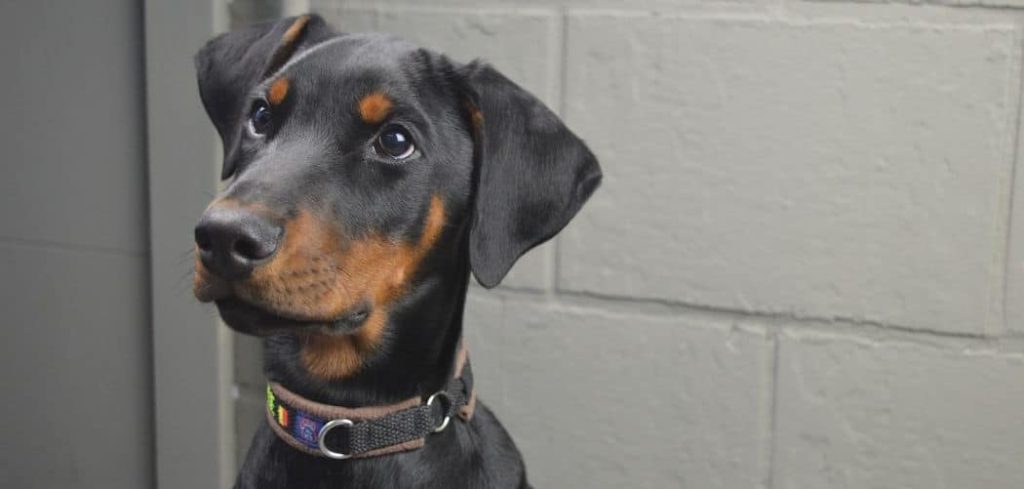Dogs often show quirky behaviors, but when a dog is excessively licking your legs, it can be concerning.
While some licking is a normal sign of affection or communication, doing it excessively may point to underlying health or behavioral issues.
We outline the common reasons why your dog may excessively lick your legs, what you can do, and when to seek veterinary help.
Dog Excessively Licking My Legs — Why It Happens
Your dog may lick your legs to show affection or because they like the salty taste of human skin, while others may lick compulsively due to anxiety or stress.
Health-related causes like skin irritation, allergies, or gastrointestinal issues can also lead to persistent licking. In some cases, the behavior becomes a habit or a self-soothing action that’s difficult for the dog to stop.

Dog Excessively Licking My Legs: Common Causes
Affection and Bonding
Dogs naturally lick as a form of communication and bonding. Puppies lick their mothers, and adult dogs may lick their humans as a way of showing love.
If your dog only licks your legs occasionally, it’s often nothing to worry about. But when it becomes excessive, it could indicate your dog is seeking reassurance or comfort more than usual.
Read more: Dog Excessively Licking My Feet (What it means)
Taste and Salt Residue
Human skin carries natural salt and scents that dogs find appealing. After exercise or on warm days, your legs may carry sweat that tastes salty.
This can encourage your dog to lick repeatedly. While this isn’t necessarily harmful, excessive licking may still cause skin irritation or reflect a deeper issue with fixation.
Anxiety or Stress
Anxiety is a common reason behind compulsive licking behaviors. Dogs may lick their owner’s legs to calm themselves, much like a child might suck their thumb.
Triggers can include separation anxiety, changes in the household, loud noises, or boredom. Over time, this behavior may escalate into an obsessive habit if not addressed.
Allergies and Skin Irritation
If your dog has allergies, licking your legs could be their way of responding to itchiness or irritation. They may redirect their discomfort by licking skin they find accessible—like yours.
Dogs with food sensitivities, flea allergies, or environmental triggers may exhibit this behavior more often, especially during flare-ups.
Gastrointestinal Issues
Dogs with nausea or digestive discomfort sometimes lick excessively as a coping mechanism. While they usually lick themselves, some dogs may turn to their owner’s skin.
This behavior may occur alongside other symptoms like drooling, decreased appetite, or vomiting. It’s important to note when the licking seems to coincide with signs of stomach upset.
Habitual or Compulsive Behavior
Sometimes, licking starts for a simple reason—affection, taste, or stress relief—but over time it develops into a compulsive habit.
Dogs with compulsive licking may seem unable to stop, even when redirected. This can indicate underlying behavioral health challenges that may require professional intervention.
What to Do If Your Dog Is Excessively Licking Your Legs
If your dog licks your legs excessively, the first step is to observe when and why it happens. If it’s tied to affection, gently redirect them to another activity like playtime or chewing a toy.
Keeping your dog mentally and physically stimulated can reduce stress-based licking.
If licking seems linked to anxiety, creating a calm environment with routines and enrichment can help. Some dogs benefit from calming aids or anxiety-relief training.
If allergies or stomach upset are suspected, monitor for additional symptoms like itching, vomiting, or diarrhea and consult a vet if necessary.
Consistently redirecting the behavior is important. Avoid punishment, as it can increase anxiety and worsen the problem. Instead, reward your dog when they engage in an alternative positive behavior.
When to Call or Visit Your Vet
While occasional leg licking isn’t usually serious, there are times when veterinary care is needed. If your dog’s licking is paired with signs of distress, anxiety, or illness, it’s best to seek professional advice.
Contact a vet if licking is accompanied by gastrointestinal issues, skin rashes, hair loss, or excessive drooling.
Also seek help if your dog seems anxious, restless, or unable to stop licking despite redirection. Persistent or compulsive licking may require both medical evaluation and behavioral support.
If the behavior develops suddenly or worsens quickly, this can be a sign of an underlying medical issue that shouldn’t be ignored.
Read more: Dog Excessively Licking My Face (Why dogs do this)
Key Takeaway
Excessive licking of your legs may seem like a quirky habit, but it can signal deeper health or behavioral issues. Affection, taste, stress, allergies, and even stomach upset can all contribute to this behavior.
Paying attention to when and why it happens can help you determine whether it’s harmless or something requiring veterinary guidance.
By observing your dog closely and providing gentle redirection, you can often manage the habit. But if your dog’s licking becomes compulsive or comes with other concerning symptoms, a veterinarian’s input is the safest path forward.
